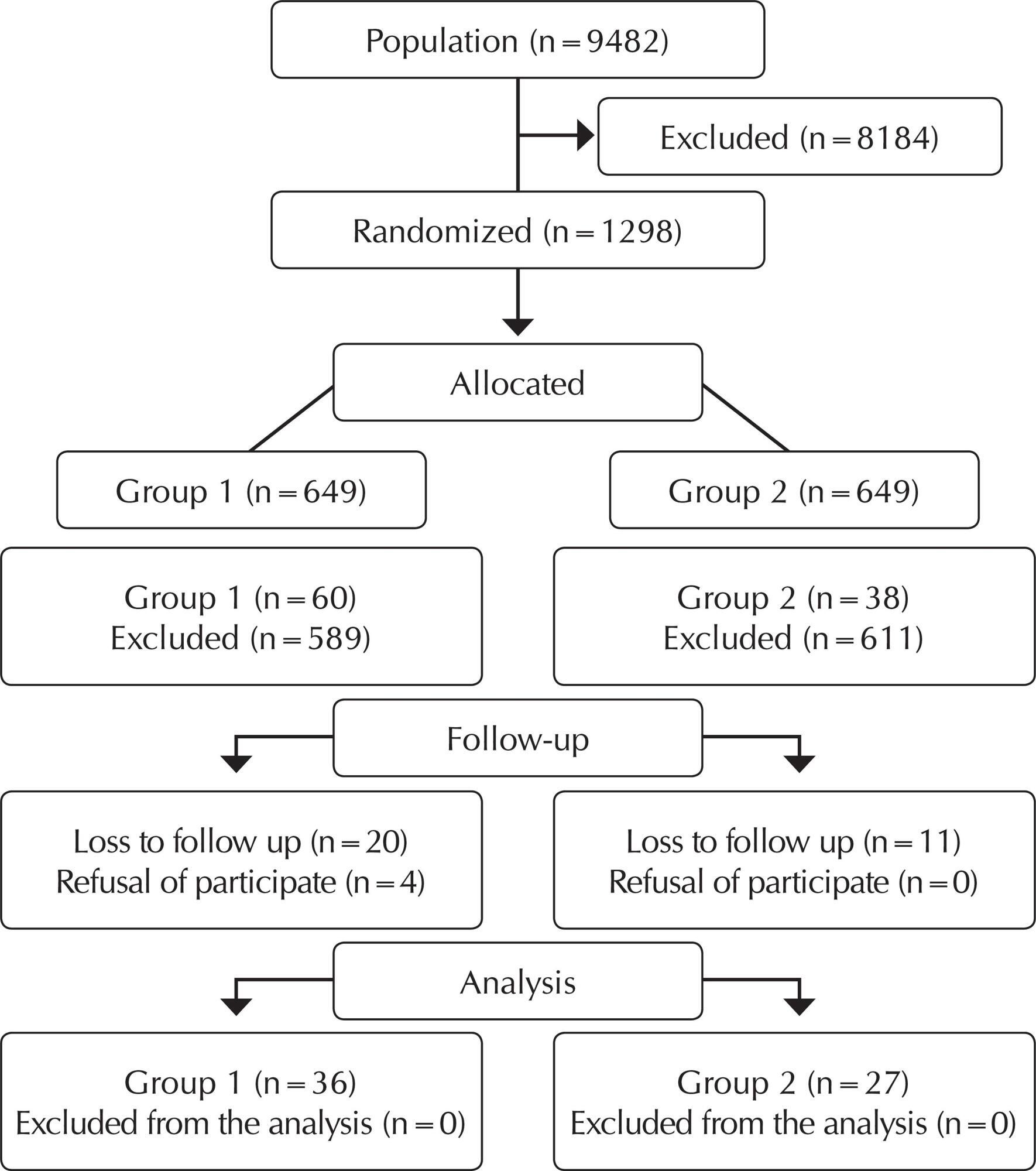-
RESEARCH
Effects of supportive telephone counseling in the metabolic control of elderly people with diabetes mellitus
Revista Brasileira de Enfermagem. 2017;70(4):704-710
01-01-2017
Resumo
RESEARCHEffects of supportive telephone counseling in the metabolic control of elderly people with diabetes mellitus
Revista Brasileira de Enfermagem. 2017;70(4):704-710
01-01-2017DOI 10.1590/0034-7167-2017-0089
Visualizações0Ver maisABSTRACT
Objective:
the purpose of this study was to evaluate the efficacy of telephone-based support for the metabolic control of elderly patients with diabetes mellitus.
Method:
a pragmatic study was conducted in two groups, called G1 (n=36) and G2 (n=27), at a health unit from the countryside of São Paulo state. Patients in G1 group received telephone support over four months, through 16 telephone contacts with educational material; for the G2 group the educational material was mailed.
Results:
significant differences were found. The G1 group showed a reduction of the parameters of fasting glucose, as well as systolic and diastolic blood pressure. In G2 group a modest reduction was noted in some parameters, with no significant difference.
Conclusion:
telephone support was effective to deliver patient education to the diabetic elderly, leading to the reduction of fasting blood glucose. This, combined with other strategies, can contribute to reduce glycated hemoglobin (NCT 01972412).

-
RESEARCH
Insulin therapy waste produced in the households of people with diabetes monitored in Primary Care
Revista Brasileira de Enfermagem. 2017;70(3):618-625
01-01-2017
Resumo
RESEARCHInsulin therapy waste produced in the households of people with diabetes monitored in Primary Care
Revista Brasileira de Enfermagem. 2017;70(3):618-625
01-01-2017DOI 10.1590/0034-7167-2016-0406
Visualizações0Ver maisABSTRACT
Objective:
To analyze the insulin therapy waste disposal produced in the households of people with diabetes mellitus (DM).
Method:
Cross-sectional study with 105 Primary Care patients. Socio-demographic and clinical variables and insulin therapy practice were analyzed through the absolute and relative frequencies, Fisher's exact test and prevalence ratio (PR).
Results:
The association between types of insulin (60.0%), administered with a disposable syringe attached to a needle (80.9%), and a high percentage of reuse and disposal in normal household waste (57.1%) stood out. The professionals who most frequently provided guidance to people with diabetes were the nurses. Patients who had received instructions about disposal were 21 times more likely to dispose of waste properly than those who had not (PR 21.5; P < 0.0001). Age, gender, skin color, education, marital status, occupational status and type of DM did not interfere in the disposal (P > 0.05).
-
RESEARCH
Nursing appointment and cardiometabolic control of diabetics: a randomized clinical trial
Revista Brasileira de Enfermagem. 2017;70(3):468-474
01-01-2017
Resumo
RESEARCHNursing appointment and cardiometabolic control of diabetics: a randomized clinical trial
Revista Brasileira de Enfermagem. 2017;70(3):468-474
01-01-2017DOI 10.1590/0034-7167-2016-0352
Visualizações0Ver maisABSTRACT
Objective:
to verify the effect of nursing appointment on cardiometabolic profile of people with Diabetes Mellitus type 2.
Method:
randomized controlled trial, developed with 134 individuals chosen for two groups: intervention and control. The intervention consisted of three nursing appointments alternated bimonthly, with two phone calls, over five months. The control group received usual care offered by the Health Unit. Data were collected through semi-structured interviews before and after the intervention, in addition to conducting laboratory tests.
Results:
after the intervention, a significant difference was shown in the amount of glycated hemoglobin (p = 0.006) and in the systolic blood pressure (p = 0.031), which were higher in the control group.
Conclusion:
besides being low-cost and easy to develop on the monitoring routine of people with diabetes, the intervention performed influenced positively the biochemical profile.
-
RESEARCH
Adherence to foot self-care in diabetes mellitus patients
Revista Brasileira de Enfermagem. 2015;68(1):111-116
01-01-2015
Resumo
RESEARCHAdherence to foot self-care in diabetes mellitus patients
Revista Brasileira de Enfermagem. 2015;68(1):111-116
01-01-2015DOI 10.1590/0034-7167.2015680115p
Visualizações0Ver maisObjective:
to analyze the self-care of patients with type 2 diabetes mellitus in the Family Health Strategy in Teresina-PI.
Method:
search cross selected by simple random sampling, 331 people with diabetes mellitus. Data collection took place from August to December 2012 with the use of Self-Care Activities Questionnaire with Diabetes and structured instrument for recording information socioeconomic and guidance received by the professional nurse.
Results:
the data revealed that patients have poor adherence to blood glucose monitoring, the physical exercise and foot care, but with good adherence to the medication. Only 38.7% of the sample examined the feet of fi ve to seven days a week. Statistically signifi cant association between self-care activities with their feet and orientations of nurses (p < 0,05).
Conclusion:
that there is need to raise awareness with regard to the development of skills for self-care.




